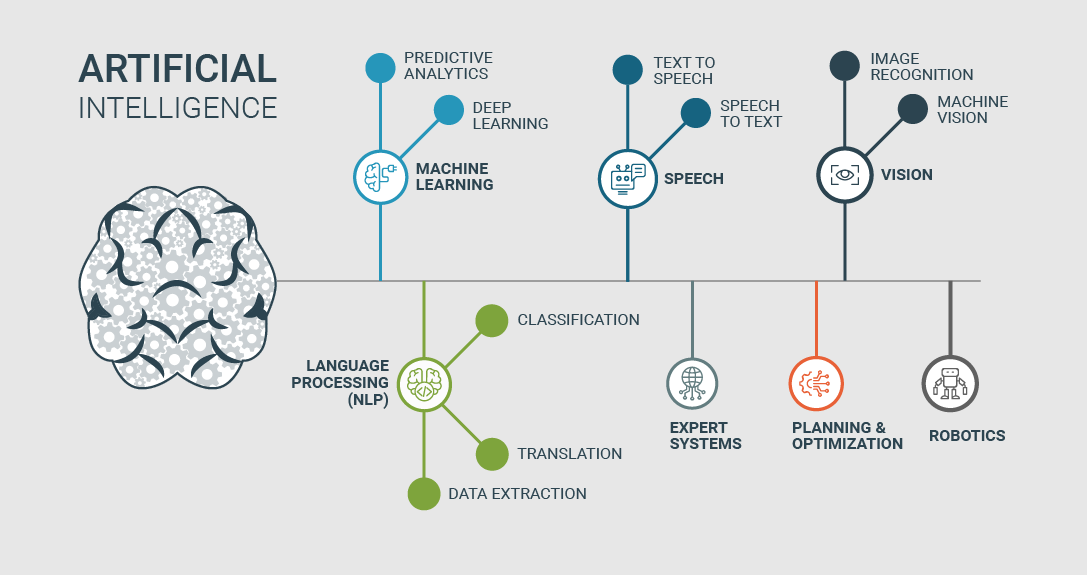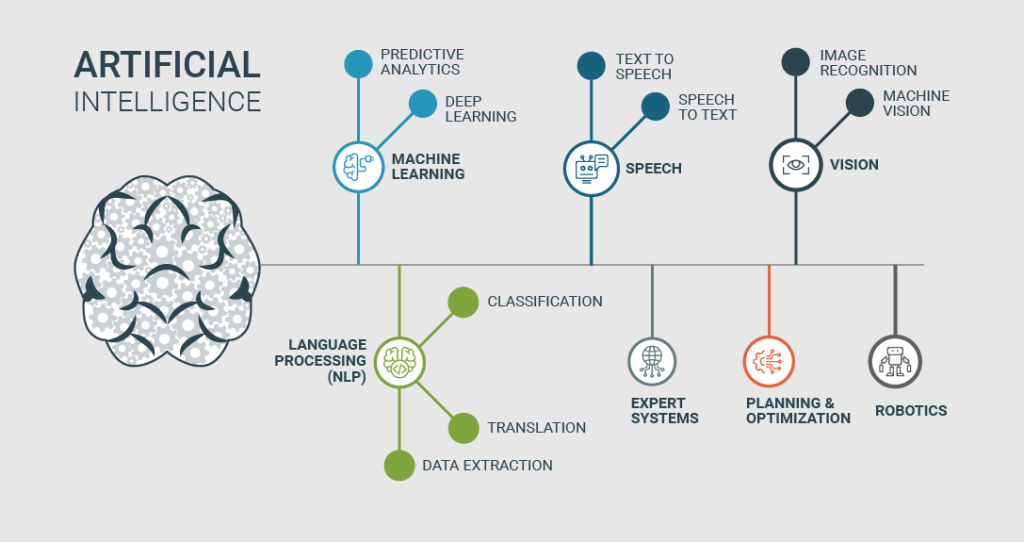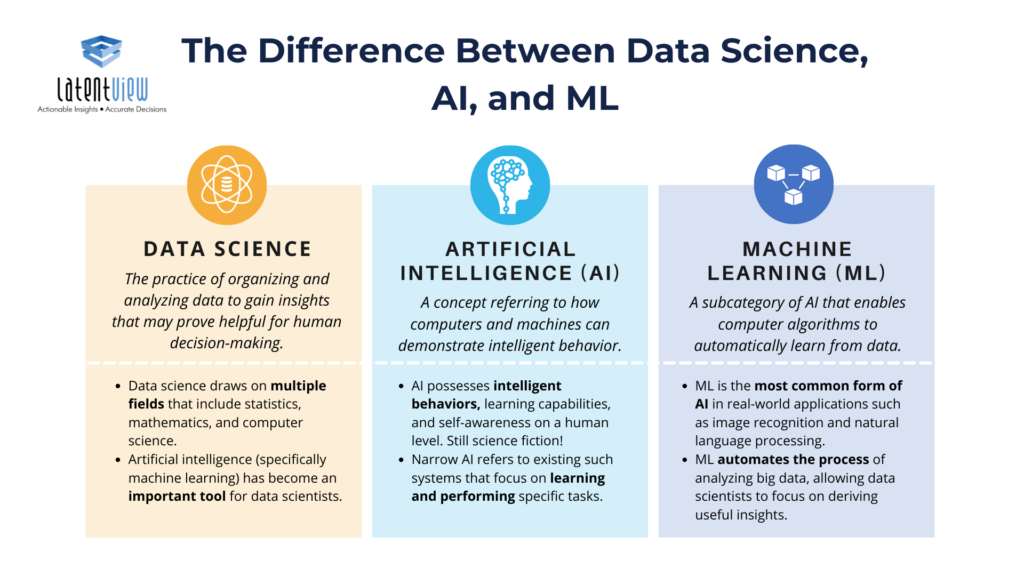
What’s an AI Engineer? Understanding Jobs in AI
Artificial intelligence is a rapidly expanding field, but as our understanding and technological capabilities grow, so does our need for qualified people to spearhead the implementation and development of such tools.
Working for the Future
Artificial intelligence is, in many ways, a divider of the working world. Its technological potential is nearly unlimited: from automation to image and language processing, to applications in robotics and healthcare. It is easy to see how it might become just as much of a paradigm shift for society as the internet once was (and still is).
But there are many who fear, as is the case with any new technology, that AI will be used to automate their jobs, leaving them out of work. Indeed, some of these sceptics are artists and writers, who feel endangered by generative AI technologies like ChatGPT and Dall-E. Rightfully so, given that there are many unanswered questions about what data these models are trained on, and whether this training can or should constitute intellectual property and copyright infringements.
While artificial intelligence has been becoming more widespread and mainstream in the last years, it is the arrival of those generative AIs that have solidified it in the public imagination. Previously our ability to directly interact with AI was often limited to those working with or developing it. You needed the technical skills, as well as the access and resources to work with it. But now anyone, regardless of their level of understanding of AI, can interact with these technologies and experience their “skills” first hand.
But as the spotlight on artificial intelligence technologies is growing, so is the need for engineers and developers within the industry. What follows is a ranking of seven AI-related roles, placed approximately in order of how much specialised knowledge about AI they require. There many other roles, often with an even more specialised focus on topics like ethics, robotics, or deep learning, which I have not featured here.

Ranking the Roles
1. AI Consultant
These consultants work with companies to identify ways in which they could benefit from the use of AI technologies. This might cover anything from reducing costs, to improving the efficiency of workflows or supply chains. Such consultants need a strong understanding of what AI technologies, services and products are available, and how they function. Because AI can be applied in so many ways in different fields, consultants often specialise in one industry, of which they have more in-depth knowledge.
Like many AI-related roles, AI consultants are often required to have a degree in a STEM subject, or a mixed STEM and business degree.
2. AI Product Manager
The role of AI product manager primarily focuses on the development of new products, from the development stage, all the way through testing and launch. Similar to the AI consultant, this is a hybrid role which requires a strong foundation of knowledge about AI works, as well as a good understanding of the market you are working in. But unlike a consultant, this role is involved in the technical aspects throughout the product development process. This means that product managers will often be in close contact with software and AI engineers, researchers, and UX designers.
These roles usually require STEM degrees, sometimes even advanced ones, as well as experience in traditional product management and delivery.
3. Data Scientist
This role is more obviously relevant in the field of “big data”, however it is incredibly key to the workings of artificial intelligence. It is often data scientists who provide the training data to all the AI, machine learning and computer vision engineers, who then use that data to build their models. For a more specific discussion on data science and the role of data science, feel free to take a look at last week’s blog.
Because of its strong statistical components, data scientists are often required to have degrees that teach analytical and computational skills.
4. AI Engineer
AI engineers are the ones who actually build, test and maintain the tools that allow for the real-world application of artificial intelligence. This is a purely technical job, which will often require close coordination with AI researchers, software engineers, and data scientists. Their role is to take insights from the researchers and data sets from the data scientists, and to build workable models and algorithms from those.
Because of this, these roles often require extensive experience in programming, with a background or degree in computer science, statistics, or maths.

5. Machine Learning Engineer
I already mentioned this role in the context of big data last week, since machine learning is a subfield of AI it is nonetheless included here. In a way the ML engineer is a more specialised AI engineer, doing much of the same work but using machine learning techniques. They too develop and maintain algorithms and models, often with the goal of automating certain processes.
Much like AI engineers, these roles require a degree in a quantitative subject and proficient programming skills. Given that there are often no formal degrees in machine learning specifically, there may also be further requirements for certifications and training courses.
6. Computer Vision Engineer
Computer vision is another subfield of artificial intelligence, which is focused on teaching machines to “see”. More technically speaking, these engineers work on teaching machines to not only process but analyse and interpret images. There is a range of applications for this kind of technology, from facial recognition to content moderation, or even in self-driving cars. While on the surface this is a purely technical role, I have previously discussed the need for more ethics oversight in this particular subfield.
Computer vision engineers need to have strong programming skills and are often required to have qualifications in computer science or information technology. Since this is a specialised field within AI, quite some people enter these roles from software engineering or data science backgrounds.
7. Research Scientist
AI researchers or scientists are most often found in research institutions or R&D departments. It is their job to push the boundaries of AI. Their research may cover anything from the development of new technologies, to investigating the environmental impacts of, or ethical issues associated with artificial intelligence. AI researchers focus on the creation of new knowledge rather than the answering of specific business problems. Their work sometimes involves working with large data sets, which means any of their findings can be turned into algorithms and models by data scientists.
These roles are the most academically focused within the ranking, and often require not only advanced degrees – usually in data science or computing – but a record of academic publishing as well.
Sources
Career Insights: What does an AI Engineer do?
How Data Science, AI, and Machine Learning Work Together | LatentView
How to Become a Computer Vision Engineer
Job Listings Asking for Generative AI Skills Are Soaring
Jobs In Artificial Intelligence – How To Make A Career In AI
The 6 most in-demand AI jobs, and how to get them | TechRepublic
What you need to know about product management for AI – O’Reilly

